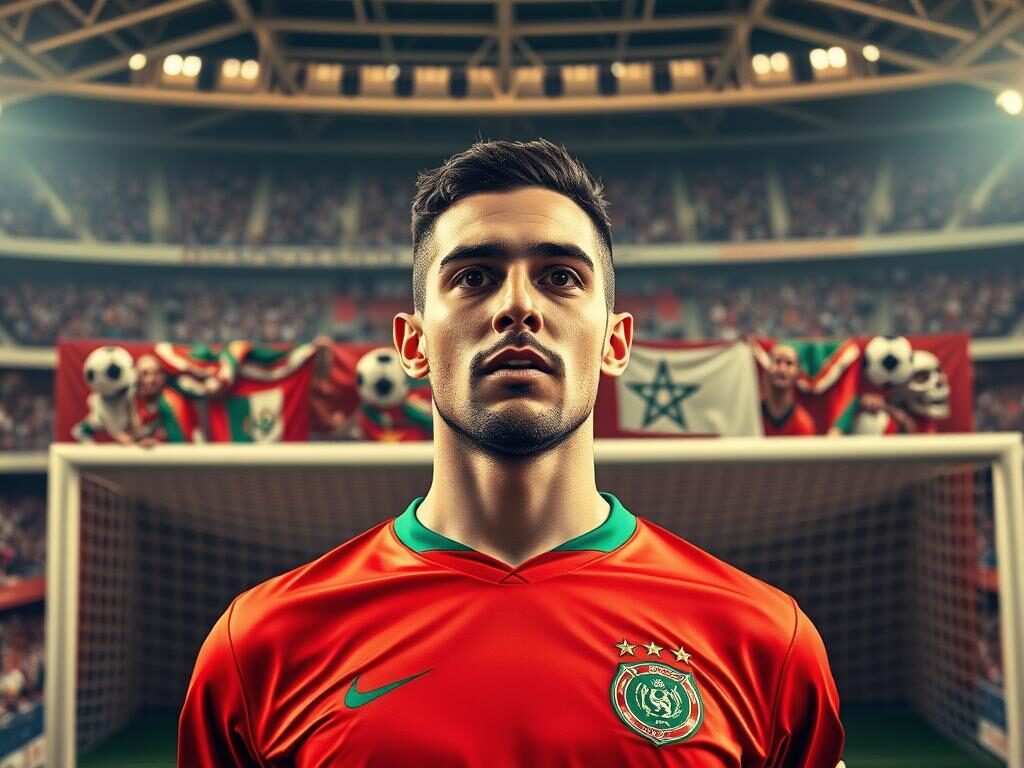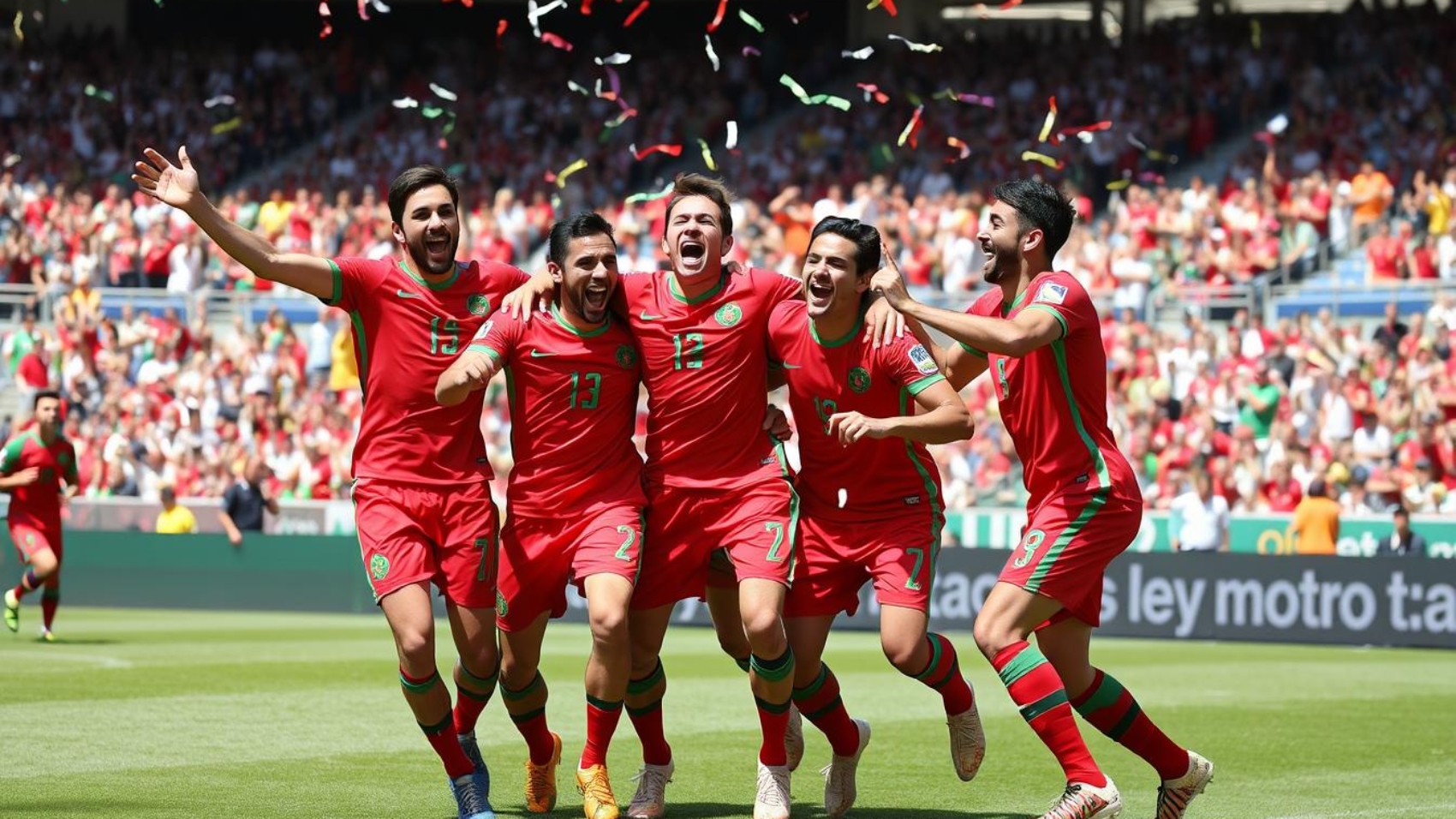The Moroccan National Team, known as the Atlas Lions, has a storied presence in international soccer. This article aims to provide a detailed guide to the evolution, triumphs, and cultural impact of the Moroccan soccer team. From their rich history to their contemporary stars, fans and sports enthusiasts alike are drawn to the remarkable journey of the Moroccan national team.
As they continue to shine on both the continental and global stages, understanding this team’s significance becomes ever more compelling.
Introduction to the Moroccan National Team
The Moroccan national team, known as the Atlas Lions, has made a big impact in Morocco football since 1956. They wear the colors of the Moroccan flag, red and green. This shows their strong connection to their country.
The Atlas Lions are more than just a team. They represent the pride and spirit of Morocco. Every game they play is filled with national pride. They compete in big events like the Africa Cup of Nations and the FIFA World Cup, showing their skill and determination.
The story of the Moroccan national team is about football’s growth in Morocco and the dreams of its people. The Atlas Lions stand for strength and unity, winning fans worldwide. Watching them play is a chance to see Morocco’s rich football tradition and determination.
The History of the Moroccan Soccer Team
The history of Moroccan soccer is filled with passion and hard work. It started in 1957 with their first international match. This marked the beginning of a significant chapter in Moroccan football.
The Atlas Lions quickly made their presence known. They joined the Africa Cup of Nations in 1957. This was their first major tournament.
In 1970, Morocco made their FIFA World Cup debut. They showed their skills to the world. Since then, the Atlas Lions have overcome many challenges and celebrated big wins.
Legendary players and key tournaments have shaped their legacy. These moments show the team’s strength and determination.
To truly grasp Moroccan football history, we must look at the decades. There have been many milestones and unforgettable moments. These highlight the team’s dedication to excellence.
Key Achievements of the Moroccan National Team
The Moroccan national team is a big name in African soccer. They have made many achievements over the years. Their success in the Africa Cup of Nations shows their skill and dedication. They have also made a mark in the Morocco World Cup, showing their journey on the global stage.
Africa Cup of Nations Triumphs
The Africa Cup of Nations is a key tournament for the Moroccan team. They won their first title in 1976, a moment fans still celebrate. They have been to the finals many times, showing their consistency and spirit.
Some of their biggest wins include:
- 1976: They won the championship without losing a game.
- 1980: They came in second, proving they are a strong team.
- 1988: They made it to the finals again, showing their lasting talent.
World Cup Journey
The Moroccan team’s World Cup journey is filled with challenges and achievements. They first played in the World Cup in 1970, becoming the first African team to do so. Their matches, like against West Germany in 1974, show their determination and strength.
Some highlights of their World Cup history include:
- 1970: They made their debut against West Germany, starting their World Cup journey.
- 1986: They made it to the knockout stage, a first for an African team.
- 2018: They played with a team aiming to improve on past successes.
The Players Who Define the Moroccan National Team
The success of the Moroccan national team is thanks to its talented players. From the current stars to the legendary Moroccan footballers, each has played a key role. They have helped shape the team’s identity and achievements.
Current Star Players
Players like Achraf Hakimi and Hakim Ziyech are changing the game. They bring a dynamic style and skill to the team. Their talent is seen in leagues all over the world.
These stars are not just improving the team’s chances in competitions. They also inspire young players to reach for the stars.
Legendary Figures in Moroccan Football
The legacy of Moroccan football legends is clear. Ahmed Faras and Mustapha Hadji were trailblazers. They broke barriers and set high standards.
Their contributions have made Moroccan football richer. They have helped raise the team’s status globally. Learning about their careers gives us a glimpse into the history of Moroccan football.
Understanding Moroccan Football Culture
The vibrant tapestry of Moroccan football culture reflects the soul of the nation. Football is a universal language that brings people together. In Morocco, it’s more than just a game; it’s a deep part of their identity.
International matches are big events that excite communities. Fans show their passion, making football a shared experience. Families and friends come together to support their team, strengthening bonds and pride.
- Traditional music fills the air during matches, enhancing the festive spirit.
- Celebrations extend beyond the pitch, involving local traditions and rituals.
- Local clubs play an essential role in shaping North African football, further solidifying community ties.
The Atlas Lions are more than a national team; they’re the heart of Moroccan culture. Football is a key part of society, bringing people together and celebrating their love for the game.
Moroccan Soccer Team Tactics and Playing Style
The Moroccan national soccer team is known for its unique approach to the game. They combine skillful playing style with structured tactical formations. Coaches use Moroccan soccer tactics that focus on quick transitions and strong defensive organization.
Adaptability is a key part of their playing style. Coaches change their tactical formations to exploit opponents’ weaknesses. This flexibility helps the Atlas Lions handle different game scenarios.
Players show strong technical abilities, making them effective in executing these strategies.
Common elements of Moroccan soccer tactics include:
- Fast-paced counterattacks that leverage speed on the wings
- Solid defensive organization, often set in a compact low block
- Fluid exchanges among midfielders, creating space for forwards
The Moroccan national team keeps evolving its playing style. They aim for success on the international stage while staying true to their tactical roots.
The Importance of the Atlas Lions in North African Football
The Atlas Lions have made a big impact in North African football. They have shown their skills on both local and international levels. Their rivalry with teams like Algeria and Egypt has made them push even harder.
Thanks to their hard work and teamwork, the Atlas Lions have made Morocco proud. They inspire many young athletes in the region. Their success goes beyond just playing football; it creates heroes and boosts local talent.
“The Atlas Lions symbolize hope and aspiration for many young players throughout North Africa.”
The Atlas Lions are role models for the next generation. They show young players that they can achieve greatness. Their drive for success has made North African football more competitive and exciting.
Morocco Soccer League: A Breeding Ground for Talent
The Morocco soccer league is key in shaping the future of football in the country. It’s not just for showing off talent but also for training young athletes. This league’s competitive atmosphere helps players grow professionally.
Key Clubs and Their Contributions
Clubs like Wydad Casablanca and Raja Casablanca are big in the league. They have a long history and help local talent shine. Their focus on youth development makes the league better.
Development of Young Players
Young player development is crucial in the Morocco soccer league. Clubs invest in long-term programs for young footballers. They offer special training, mentorship, and chances to play at higher levels. This makes the league a place where future stars are born, boosting the nation’s football culture.
Recent Performance in International Competitions
The Moroccan national team has caught a lot of attention lately. This is especially true during big tournaments like the Africa Cup of Nations (AFCON) and the Morocco World Cup qualifiers. They have shown great resilience and talent, which is good for Moroccan football worldwide.
In the Morocco World Cup qualifiers, the team mixed experience with young energy. This mix worked well, helping them get important points and a strong position in their group. The players have been key in using their strengths, like quick counterattacks and solid defense.
Their performance in the AFCON also shows their competitive edge. Morocco won important games, boosting their confidence. The team’s unity has been impressive, making them a tough opponent for others.
- Strong defensive tactics in matches
- Effective use of speed on the attack
- Key performances from star players
The Moroccan national team keeps getting better and adapting. They are now seen as contenders in future games. The hard work of the coaches and players is clear, driving their goal for success in Africa and globally.
Challenges and Opportunities for the Moroccan Soccer Team
The Moroccan national team faces many challenges. These include picking the right players, dealing with injuries, and facing tough competition from other African teams. Each time they try to qualify, they face new obstacles that can affect their performance.
Despite these hurdles, the team has a bright future. Investing in new training facilities and youth academies is key. These efforts help grow the next generation of players, improving their skills and chances of success.
It’s crucial for the team to balance these challenges and opportunities. By fixing current problems and using new facilities, they can improve their position in African football.

Conclusion
The Moroccan national team has a rich history filled with triumphs and a dedicated fan base, known as the Atlas Lions supporters. They have made a name for themselves in the Africa Cup of Nations and World Cup. This shows their legacy is strong and growing.
The team’s success is not just about past wins. It also inspires them to reach for more in the future. This legacy drives them to keep striving for excellence.
The future of the Moroccan national team depends on fan support, clubs, and the football community. Developing young talent in local leagues is key. It shows the importance of nurturing talent for the Atlas Lions’ future.
As the team gears up for new tournaments, working together to improve their performance is crucial. This effort will help them compete on the African and global stages.
The Moroccan national team’s journey ahead is full of promise. With dedication and a strong foundation, they can achieve even more in international football. Their past achievements and future goals will shape Morocco’s soccer story.


